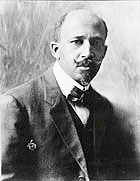This Day in History: August 27, 1963
Additional Date: August 27, 1963
William Edward Burghardt Du Bois was a giant among African American activists. He was a key founder of the NAACP, the largest and oldest civil rights organization in the United States, and from 1910 to 1934 served it as director of publicity and research, a member of the board of directors, and editor of the Crisis, its monthly magazine. During this period NAACP advocacy was instrumental in securing anti-lynching legislation.
Besides serving as editor of The Crisis, Du Bois published numerous important works on race. By the time of his death in 1963 he had written 17 books and edited four journals, and greatly influenced public discourse on race relations not only in the United States, but also all over the world. His works remain required reading for activists and social thinkers to this day.
Although Du Bois life is intertwined with the early history of the NAACP, there existed a growing tension between the two as his views radicalized over time. In 1934 he resigned over the issue of a national activist strategy. Du Bois favored a movement toward African American controlled schools, businesses, and institutions. The NAACP advocated integration.
Concerned with the conditions of people of African descent wherever they lived, Du Bois was long an champion of pan-Africanism, Du Bois organized a series of pan-African congresses around the world, in 1919, 1921, 1923, and 1927. The delegations comprised of intellectuals from Africa, the West Indies, and the United States.
As Du Bois aged his lifelong feelings of alienation became more acute, and his leftist opinions more outspoken. After World War II his views on U.S. - Soviet Relations and arms control set him at odds with the U.S. government. Finally, the Department of Justice ordered DuBois to register as an agent of a "foreign principal." DuBois refused and was immediately indicted. The incident is cited as catalyst in convincing DuBois that he no longer belonged in the United States. While traveling in China in 1959, he told a large audience-"In my own country for nearly a century I have been nothing but a NIGGER." By the time news of the account reached the U.S., he had already immigrated to Ghana. In the final months of his life DuBois became a Ghanian citizen and an official member of the Communist party.
